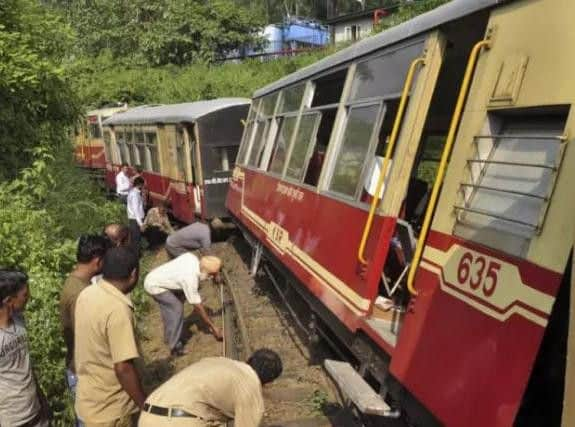'Bold and adventurous' Sheffield mum's death caused by derailment of speeding train, rules coroner


Loraine Tonner was one of two women killed when a tourist servicebetween Kalka and the Himalyan town of Shimla came off the tracks approximately five minutes into the journey that began at 12.45pm on September 12, 2015.
Joan Nichols, 60, of South Shields was the other person killed when the train, chartered by York-based company Great Railway Journeys, crashed.
Advertisement
Hide AdAdvertisement
Hide AdSheffield Coroners' Court heard how Mrs Tonner, 55, was travelling in the second of four carriages on the so-called 'toy train' with her husband Robert Payne when the fatal derailment took place.


The couple were sat next to each other with the aisle separating them, after Mrs Tonner moved seats in order to be facing the direction of travel.
In a statement read before the court, Mr Payne described how when he was looking out of the window a few moments into the journey he noticed that the front carriage appeared to be leaning to the right.
"I seemed to know instinctively that it was coming off the tracks," he said.
Advertisement
Hide AdAdvertisement
Hide AdAt around 12.51pm the front two carriages of the narrow-gauge train came off the rails. Mr Payne was thrown across the carriage, while witness Paul Carr described how Mrs Tonner was 'catapulted' out of the carriage window.


Once the train had been brought to a halt, several people climbed out to try and come to Mrs Tonner's aid, using bottled water, cotton wool from the first aid box and cushions and pillows to try and make her comfortable.
Mr Payne was coming in and out of consciousness from wounds he suffered in the derailment during this time, the court heard.
Mrs Tonner sadly passed away from the multiple injuries suffered in the crash, prior to the emergency services arriving at the scene at around 1.25pm.
Advertisement
Hide AdAdvertisement
Hide AdSpeaking after this morning's inquest, Mrs Tonner's family made a moving tribute to her.
They said: "She was a bold, adventurous, positive Glaswegian with a sharp sense of humour."
The court heard witnesses describe their surprise at how fast the train was being driven, after they were told to expect that the 89km journey between Kalka and Shimla would take between five and six hours to complete. Had the train stuck to the agreed journey estimate, it should have been travelling at speeds of an average of 17km per hour.
Passenger, Ian Calder, said: "We quickly became concerned at the speed it was travelling at," adding that the train only just managed to safely navigate the first bend it approached.
Advertisement
Hide AdAdvertisement
Hide AdHe added: "The train continued to gather speed as we got to the corner. We heard a screeching noise, and it derailed."
An interim railway safety report, conducted by Indian rail authorities, revealed that the train had traveled just over 3.1km before it derailed as it attempted to make its away around a second tight bend, six minutes into the journey.
The author of the report calculated that the train must have been travelling at speeds in excess of 40 kilometers (km) an hour when it came off the tracks, despite the legal limit for the area being 25km.
The train's speedometer stopped working about 20 minutes before the journey began, and an alternative method for measuring speed, using the distance between telegraph poles as an indicator, was not used, the report added.
Advertisement
Hide AdAdvertisement
Hide AdCoroner Christopher Dorries, delivered a verdict of narrative conclusion for both women.
He said: "Mrs Tonner died in India on September 12, 2015 of injuries received when the narrow-gauge train on which she was travelling derailed.
"The train derailed because it was being driven to a speed in excess of 40 kilometers per hour on a track that carried a limit of 25."
Mr Payne told the court he wanted it put on record that he did not have any criticisms to make of Great Railway Journeys.
He said: "They did everything they could, in the immediate and aftermath [of the derailment] so I have no criticism to make."
Great Railway Journeys have been approached for comment.